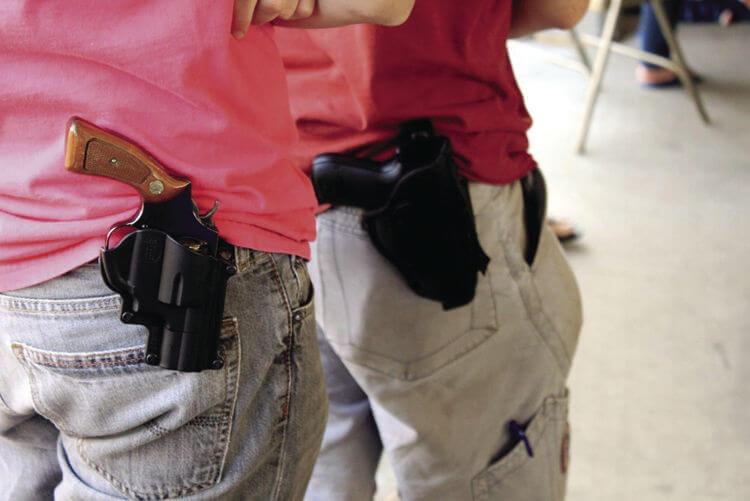As of September 1, 2021, a new set of gun laws came into effect in Texas which, among other things, loosen firearm restrictions and licensing requirements in certain public settings, and allow “permitless” or “Unlicensed Carry” for most adult residents. They also prohibit government agencies at the state and local level from enforcing new federal gun laws.
Gun stores will now be deemed essential and cannot be shut down during an emergency or other disaster. There is also a new sales and use tax exemption for firearm safety equipment. Hotel guests are also explicitly allowed to carry firearms and ammunition and may store these in their hotel rooms.
This article will briefly review some of these changes in detail that are most relevant to businesses operating in Texas.
Unlicensed Carry and Related Laws
Citizens over the age of 21 (and not legally barred from owning a firearm) may now carry handguns in public, without a license. With these changes, Texas becomes one of twenty states with either permitless or similar “Constitutional carry” laws. This change creates three “categories” of carry in Texas: Unlicensed Carry, Licensed Concealed Carry, and Licensed Open Carry.
This new law does not end the right of a private businesses to prohibit the carry of firearms on their property. It does, however, place certain legal requirements on a business in order to lawfully prohibit the carry of firearms inside their establishment. If a business owner wants to ban guns, they must provide proper notice to people entering their property. Although this may be communicated verbally, in most instances it is more convenient to use written communication through appropriate signage.
Any written notices must comply with the guidelines set out in Texas law, including existing licensing requirements as well as the new legislation allowing guns to be carried in public without a permit. This means there are different rules for signage that prohibits Unlicensed Carry versus Licensed Concealed Carry or Open Carry. Businesses that wish to place this type of signage should contact a local attorney knowledgeable in state gun laws to ensure they are complying with all of these different requirements.
Prohibited Places
Some types of private property remain prohibited places where firearms are not generally allowed, irrespective of the new Permitless Carry laws. This includes a number of public and quasi-public places, including a school or education institution or school bus (without a permit), amateur sporting events, any polling place during an election, courts, the secured area of an airport, prisons, and meetings of government entities where notice of the prohibition is provided. There is also a general prohibition on firearms in certain private businesses, including amusement parks, racetracks, and any establishment which earns more than 51% of its income from the sale of alcoholic beverages. These latter types of operations, usually bars and nightclubs, are required to post the Texas Alcohol Beverage Commission sign which notifies all patrons that the carry of firearms on the premises is prohibited by state law, available from the TABC website.
Other Changes to Gun Laws Impacting Private Businesses
One of the changes to the law prohibits government entities from contracting with businesses that “discriminate” against firearm or ammunition industries. This is intended to target banks and financial institutions, which must provide written confirmation that they do not have internal policies or other guidance targeting those industries. For example, some banks prohibit their commercial clients from selling certain products used to modify firearms, or from selling firearms to individuals younger than 21 or who have not passed a background check. Others have ceased business loans to certain types of gun manufacturing operations. Under the new laws, these banks will not be permitted to contract with the Texas government or related entities. The State of Texas has already barred Bank of America, CitiBank, and JP Morgan Bank from handling municipal bonds within the state due to the banks’ discrimination against gun owners and companies.
Previously Enacted Gun Laws Remain Relevant
Employers remain entitled to prohibit their employees from carrying firearms on company property: the new laws have not amended the Labor Code which allows such prohibitions. Employers also remain protected from civil liability arising from an occurrence involving a firearm that they are required to allow on their property. They are also not presumed to have rendered their workplace unsafe where a firearm is present.
Despite these ongoing protections, employers may wish to take proactive steps to communicate their handgun policies to their employees and head off any potential issues that might arise. Reidel Law can advise businesses about their legal rights and obligations with respect to these new laws.
Since 2019, Texas law also restricts the ability of landlords to ban guns on residential property. Tenants cannot be prevented from the lawful possession of firearms and ammunition at their rental property, nor from directly transporting those items from their rented premises to their vehicles.
Get Local Legal Advice About Gun Laws in Texas
Business owners should be aware of how these new laws could impact their operations. The first step is contacting the knowledgeable legal team at Reidel Law Firm. Based in Texas, we stay on top of important state business developments, so our clients can focus on what they do best – running their bsuiness.
Reidel Law Firm can advise companies about how new and existing gun laws impact their employment relationships and potential civil liability, and help ensure your ongoing compliance. Call 1-832-510-3292 or use the email button below to speak with an attorney about your questions.


